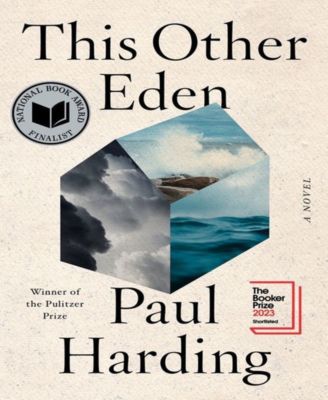This Other Eden- A Novel by Paul Harding
Product details
Web ID: 15419913A bunch of incomplete thoughts
This story could have been great but I felt the author just skipped from topic to topic not fully developing anything expect the 10 page church sermon.

Customer review from barnesandnoble.com
Quick and powerful
I didn't know what to expect when I started this historical novel. Lately, I have been gravitating to books I know have a happy plot (or at least ending). Although Paul Harding begins this beautiful novel with the tragic end, you are immediately hooked by the language and characters. I highly recommend this book.
Recommends this product

Customer review from barnesandnoble.com
Beautiful and Disturing
Terrible how terribly good intentions turn out almost every time. from This Other Eden by Paul Harding “Malaga Island was home to a mixed-race fishing community from the mid-1800s to 1912, when the state of Maine evicted 47 residents from their homes and exhumed and relocated their buried dead. Eight islanders were committed to the Maine School for the Feeble-Minded.” from Maine Coast Heritage Trust, quoted in This Other Eden The novel opens with the riveting story of a terrible storm washing over a small island off the coast of Maine, with a family clinging to the branches of a large tree and watching houses and people caught in the angry waters in the flood below. The Eden that Benjamin Honey had built was destroyed in 1815. His wife Esther tells the tale to her grandchildren, the history of their Ark island. The Honey family had lived there for six generations, since an African ex-slave Civil War veteran and his Irish wife settled there. Their neighbors included the Larks with their colorless children, and the McDermott sisters who took in three orphaned Native American children, and the spinster Annie Parker, and Civil War veteran Zachary Hand who preferred his hollow tree to his cabin. The mixed races of the families had produced individuals of every type, the pale and the dark, green eyes and red hair, straight hair and tightly curled. It’s a harsh life but they have survived. Theirs is a tolerant society where brother and sister raise their children, and a man can don his mother’s dress to keep house while his wife cuts her hair and goes fishing on the ocean. The state sent a pastor to open a school. The community is Christian, the Bible and Shakespeare among the few, tattered books in the community. The teacher discovered a girl who is a mathematical prodigy, a boy who masters Latin, and another who is a gifted, untrained artist. The Eugenics movement was at its height. The islanders were disturbing. They were measured and assessed, labeled and judged to be degenerate by the “plain white” of the mainland. The mixing of races, the intermixing of blood, could not produce anything but imbeciles, morons, and degenerates. The entire population of Apple Island was relocated, many to institutions. The early book takes us into these people’s lives and personalities. Yes, there are relationships that we may judge to be perverse. There are people whose sanity we may doubt. A girl who only eats wild things she finds, starfish and snakes. One woman was abused by her father, and intended to murder the resultant child. She was prevented, and her child and his children became the center of her old age. Zachary Hand carves images in his hollow tree where he finds peace. But we have sympathy for these people. They are removed from the world and a society that could not have accepted them, eking out a subsistence life, doing the best they could with what they had. The teacher determines to ‘save’ one child of the island, a fifteen-year-old boy with straight hair and and greenish eyes. He writes an acquaintance, hoping he would take the boy in until he could enter art school. It seemed a mercy to separate Ethan Honey from his family’s fate, to allow him access to white society. For all his good intentions, the teacher creates a series of disastrous events. Years in the future, historians will explore the buried history of the deserted island, and write about the paintings and drawings of the mysterious Ethan Honey. Beautifully written, with stunning descriptive passages and a mounting urgency, this is a novel of history and a vision of what society could have become, a condemnation and a warning. I received a free galley from the publisher through NetGalley. My review is fair and unbiased.
Recommends this product

Customer review from barnesandnoble.com

